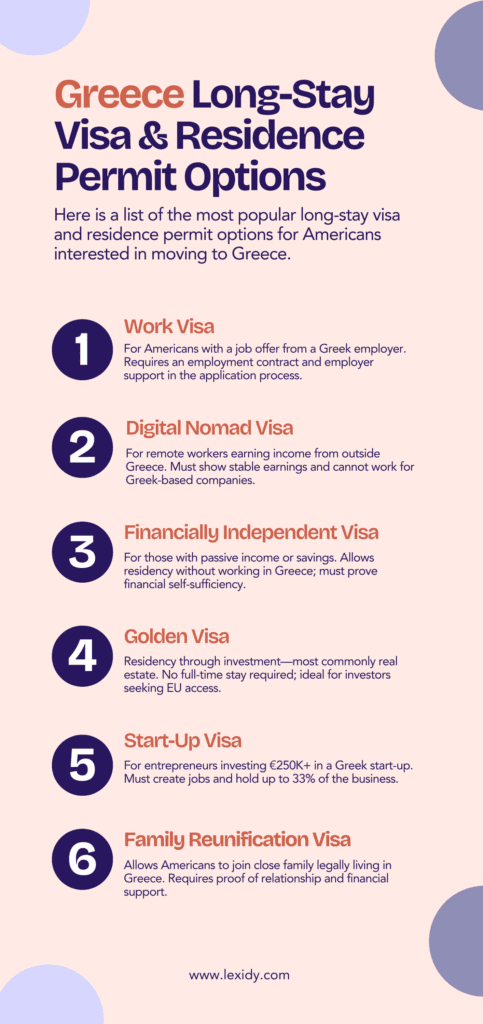Dreaming of a fresh start in the Mediterranean? Moving to Greece from the USA is becoming a reality for more Americans seeking sun, culture, and a better quality of life. With its relaxed lifestyle, low cost of living, and gateway to the European Union, Greece has become a top destination for expats from the United States.
Whether you’re drawn by its ancient charm, remote work potential, or retirement benefits, Greece offers more than just a scenic escape. It offers a new way of life.
This guide walks you through every step of the process, from choosing the right visa to finding a home, managing taxes, and settling in with confidence.
Table of Contents
- Can Americans Move to Greece?
- Long-Stay Visa and Residence Permit Options for Moving to Greece from the USA
- Taxes for Americans Moving to Greece
- Healthcare in Greece: Public vs. Private
- Cost of Living in Greece Compared to the U.S.
- Adjusting to Greek Culture and Language
- Employment and Business Opportunities
- Opening a Bank Account and Managing Finances
- Steps to Prepare Before Moving to Greece from the USA
- How Lexidy Can Help You Move to Greece from the USA
Can Americans Move to Greece?
Yes, you can move to Greece from the USA and enjoy everything it has to offer, from island living to urban charm.
U.S. citizens can enter Greece without a visa for up to 90 days within a 180-day period. However, if you’re planning to stay longer, whether for work, retirement, or personal reasons, you will need a long-stay visa, also known as a type D visa.
This guide is focused on Americans who want to relocate for the long term, not just for tourism.
Can Americans move to Greece? Find out which visa is right for you and how our lawyers help.
Long-Stay Visa and Residence Permit Options for Moving to Greece from the USA

To live in Greece long-term, Americans must first apply for a national (Type D) visa before arriving and then secure a residence permit. Here are the most common pathways for moving to Greece from the USA:
Work Visa
The Work Visa is for Americans who have secured employment with a Greek company. Applicants must present a valid job offer and employment contract, typically before entering Greece. The employer often assists with the application process.
Digital Nomad Visa
The Digital Nomad Visa is tailored to remote workers and freelancers who earn income from outside Greece. To qualify, applicants must prove a steady monthly income of at least €3,500 for the main applicant, plus an additional 20% to include a spouse and 15% for each dependent child. Holders of this visa are not permitted to work for Greek-based companies.
Financially Independent Person (FIP) Visa
The Financially Independent Person (FIP) Visa is for individuals who can support themselves through pensions, savings, or passive income. Applicants must show proof of at least €3,500 in monthly income or, alternatively, €126,000 in savings. This option does not allow the holder to work in Greece.
Golden Visa for Greece
The Greek Golden Visa is a residency program for non-EU nationals who invest in Greece. It’s a popular option because it does not require full-time residency. You can keep your lifestyle abroad while enjoying the benefits of Greek residency.
Real Estate Investment (Most Popular Route)
For those looking to move to Greece from the USA with the Golden Visa, the most popular type of investment is real estate. The required investment depends on the location and type of property:
- Minimum €800,000 for property in high-demand areas like Athens (Attica), Thessaloniki, Mykonos, Santorini, and larger islands (with over 3,100 residents).
- Minimum €400,000 for property in all other regions of Greece.
- Minimum €250,000 for properties that were previously commercial but have been officially converted to residential.
Important: In all cases, the investment must be made in a single property that is at least 120 square meters in size.
Alternative Investment Options
Not interested in real estate? You can still qualify for the Golden Visa through other financial routes:
- Invest €500,000 in shares or capital contributions to Greek companies.
- Invest €500,000 in Greek government bonds.
- Make a €500,000 deposit in a Greek bank for a minimum of 12 months.
Start Up Visa
Greece’s Start-Up Visa offers non-EU nationals a way to gain residency by investing in innovative Greek businesses. It’s designed to attract entrepreneurs and boost the country’s growing innovation ecosystem.
How It Works
To qualify, the investment must meet the following conditions:
- Invest at least €250,000 in a start-up listed in Greece’s National Start-Up Register.
- Create at least two jobs within the first 12 months.
- Maintain those jobs for five years.
- Hold at least 33% ownership in the start-up.
Who Can Apply?
Both individuals and companies can make the investment:
- If a Greek company makes the investment, the foreign individual who owns 100% of that company can apply for a residence permit.
- If a foreign company invests, up to three non-EU individuals can receive residence permits, as long as each person owns at least 33% of the company (depending on the size of the investment).
Family Reunification Visa
The Family Reunification Visa allows Americans to join immediate family members legally residing in Greece. Applicants must prove their relationship and show that the family member in Greece has sufficient income and accommodation to support them.
Exploring visa options in Greece? Get trusted legal support every step of the way..
Taxes for Americans Moving to Greece

If you spend more than 183 days in Greece in a calendar year, you’re considered a tax resident. This means you must report and pay taxes in Greece on your worldwide income, including U.S. salaries, pensions, and investment gains.
In addition to income tax, social security contributions apply to both employees and the self-employed. These cover health care, pensions, and other benefits.
Thanks to the U.S.–Greece tax treaty, most individuals who move to Greece from the USA can avoid being taxed twice on the same income. While Americans must still file with the IRS each year, credits and exemptions may apply for income already taxed in Greece. Managing tax obligations in both countries is key.
Special Tax Regimes Available
Greece offers several favorable tax programs for newcomers:
- Non-Dom Regime: High-net-worth individuals can pay a flat €100,000 annual tax on foreign income for up to 15 years. Family members can be added for €20,000 each.
- Foreign Pensioners: Those transferring tax residence to Greece may qualify for a 7% flat tax on worldwide pension income for up to 15 years.
- Relocated Workers & Freelancers: Employees and self-employed professionals moving to Greece may receive a 50% tax exemption on their employment income for up to 10 years.
Healthcare in Greece: Public vs. Private

When moving to Greece from the USA, one key consideration not to forget is healthcare. Greece has a national public healthcare system called ESY (Ethniko Systima Ygeias). It provides affordable medical services to residents who contribute to the social security system (EFKA). This includes employees, self-employed individuals, and retirees with sufficient contributions.
Public Healthcare
- Offers access to hospitals, general practitioners, and specialists.
- Services are either free or low-cost, depending on your coverage.
- Wait times can be long and English-speaking staff may not always be available.
Private Healthcare
- Faster access to specialists and better-equipped facilities.
- More English-speaking professionals.
- Costs are higher but often covered by private health insurance plans.
For individuals moving to Greece from the USA, public coverage only applies once you’re formally registered, employed, or paying into social security. That’s why most Americans begin with a private international or expat health insurance plan, especially during the visa process or initial months of residency.
Some visas, such as the Digital Nomad or FIP Visa, even require proof of comprehensive private health coverage as part of the application.
Finding Housing in Greece
Whether you plan to rent or buy, finding housing in Greece as an American expat is relatively straightforward, but local knowledge goes a long way.
Most expats begin with a long-term rental, especially while settling in or waiting for residence permits. Popular real estate platforms exist, but listings can be outdated or inconsistent, so it’s best to work with a local real estate agent who understands your needs and speaks English.
Some of the most popular areas for American expats include:
- Athens offers a mix of modern living, rich culture, and international schools.
- Crete is known for its laid-back pace, scenic coastlines, and friendly communities.
- Thessaloniki is Greece’s second-largest city with a vibrant food and student scene.
- Peloponnese is a more rural, historic region with growing interest among retirees.
If you’re considering buying property, it’s essential to conduct proper due diligence with the help of a real estate lawyer and notary. Foreigners are allowed to purchase property in most parts of Greece, although some border areas may require additional approval.
For smoother transitions, some expats also turn to relocation services that assist with lease negotiation, utilities setup, and even school enrollment for families.
Cost of Living in Greece Compared to the U.S.
One of the biggest draws for those moving to Greece from the USA is the relatively low cost of living. While expenses vary depending on location and lifestyle, most expats find they can live comfortably on less than they would spend in the U.S.
Here’s a breakdown of how common expenses compare across cities. These figures are based on recent 2025 estimates and reflect general price ranges for a single person or couple:
| Category | Athens, Greece (in USD) | New York City, NY | Atlanta, GA | San Antonio, TX |
| Monthly Rent (1 BR, city center) | US$648.0–$972.0 average rent for a 1-BR apartment | US$2,287 average rent for a 1‑BR apartment | US$1,498 median for a 1‑BR apartment | US$1,204 average rent for a 1‑BR apartment |
| Groceries (monthly for one) | US$216.0–$324.0 | US$400–$600 | US$350–$500 | US$250–$350 |
| Dining Out (meal for two) | US$32.4–$64.8 | US$100+ for a mid-range meal | US$60–$100 | US$50–$90 |
| Public Transport (monthly pass) | US$32.4–$43.2 | US$127–US$132 for MetroCard | US$95 MARTA pass | US$50–$70 |
| Private Health Insurance | US$64–$162/month (expat plans) | US$300–$700+/month | US$300–$600/month | US$200–$500/month |
While the cost of living in Greece varies by region, even its urban centers like Athens are significantly more affordable than comparable U.S. cities. In smaller towns or rural areas, the savings can be even greater, offering American expats a high quality of life at a lower cost.
Adjusting to Greek Culture and Language

English Is Common, But Not Universal
While many Greeks speak English, especially in cities and tourist areas, it’s not guaranteed in daily life. Public services, healthcare, and rural areas may require basic Greek. Learning key phrases will go a long way.
Time and Bureaucracy Work Differently
Greek life runs at a slower, more flexible pace. Appointments may start late, and processes like paperwork or permits can take time. Expect delays and plan with patience.
Mealtime Is a Social Event
Greeks eat lunch around 2–4 PM and dinner after 8 PM. Meals are often long and social. Dining out with friends or family is a major part of local life.
Opening Hours Can Vary
Many businesses, including pharmacies and small shops, close on Sundays or operate limited hours. Planning ahead is important, especially outside of major cities.
Cash Is Still King in Some Areas
While card payments are widely accepted in urban areas, smaller towns and villages may prefer cash. It’s best to have both options available.
Employment and Business Opportunities

Job Market for Expats
Finding a job in Greece as an American can be challenging unless you already have a contract in place or specialized skills in high-demand fields. Most jobs require fluency in Greek, but sectors like tourism, tech, and international companies may offer English-speaking roles.
Remote Work on the Rise
Thanks to improved infrastructure and supportive visa options, Greece has become a hotspot for remote workers. The Digital Nomad Visa allows Americans to live in Greece while working for employers or clients outside the country, provided you meet the income requirements.
Starting a Business in Greece
Greece welcomes foreign entrepreneurs, and Americans can set up a business with the right legal structure and permits. Popular options include setting up a sole proprietorship (for freelancers) or forming a limited company. Having a local legal team can help simplify tax registration, licensing, and compliance with Greek law.
Opening a Bank Account and Managing Finances
Opening a local bank account is a key step when relocating to Greece. It makes day-to-day living easier and is often required for paying rent, receiving income, and staying compliant with local tax laws.
What You Need to Open a Greek Bank Account:
- Valid passport.
- Greek Tax Identification Number (AFM).
- Proof of Greek address (e.g. lease agreement or utility bill).
Some banks may ask for additional documentation, such as proof of income or a Greek phone number.
Banking Basics
Greece uses the euro (€) as its official currency. Bank branches are generally open Monday to Friday, from 8:00 am to 2:00 pm. Online banking is widely available and recommended for convenience.
Transferring Money from the U.S.
International wire transfers are common, though they may take several days and incur fees. Many expats use online platforms or fintech apps for better exchange rates and faster processing.
Opening a local account also simplifies tax reporting and helps avoid potential issues with double taxation or financial declarations.
Steps to Prepare Before Moving to Greece from the USA

Planning ahead is essential for a smooth relocation to Greece from the USA. Here’s a practical checklist to help you stay organized:
- Gather essential documents (passport, birth certificates, marriage certificates, bank statements).
- Choose your visa path based on your situation (work, financially independent, digital nomad, etc.).
- Apply for a national visa (Type D) before leaving the U.S..
- Line up housing in Greece, either a short-term rental or permanent residence.
- Secure health insurance that meets visa and residency requirements.
- Schedule appointments with the Greek Immigration Office (SEF) for your residence permit once in Greece.
To avoid delays and costly mistakes, many Americans find it helpful to consult legal or immigration professionals who specialize in Greek relocation. They can guide you through each step and ensure your move is legally sound and stress-free.
How Lexidy Can Help You Move to Greece from the USA
Moving to Greece from the USA involves more than just booking a flight. From choosing the right visa to understanding taxes and securing long-term residency, the process includes several legal and administrative steps that can feel overwhelming without expert guidance.
Lexidy’s legal team helps simplify the transition. Whether you need support with:
- Preparing and submitting your visa application.
- Understanding your tax obligations in Greece and the U.S..
- Setting up a business or managing your move as a remote worker.
- Handling real estate, healthcare registration, or family reunification.
Ready to move to Greece from the USA? Our lawyers are here to help Americans navigate each step confidently. Fill out the form below to get started!

